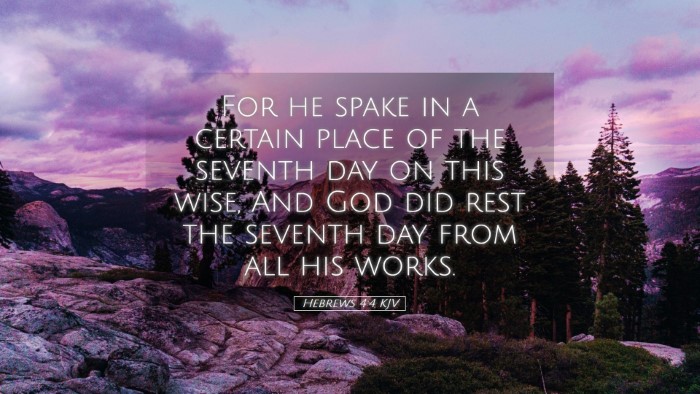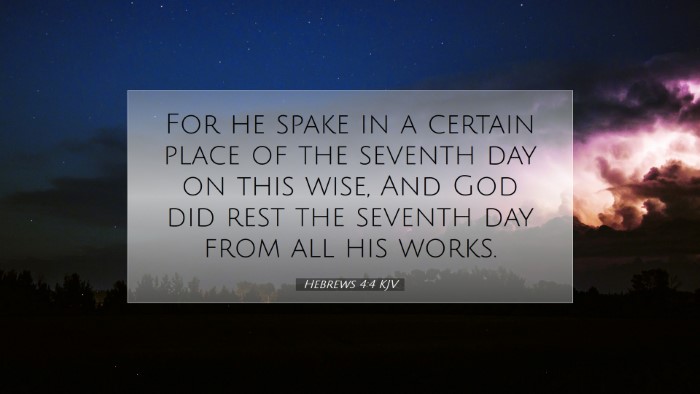Old Testament
Genesis Exodus Leviticus Numbers Deuteronomy Joshua Judges Ruth 1 Samuel 2 Samuel 1 Kings 2 Kings 1 Chronicles 2 Chronicles Ezra Nehemiah Esther Job Psalms Proverbs Ecclesiastes Song of Solomon Isaiah Jeremiah Lamentations Ezekiel Daniel Hosea Joel Amos Obadiah Jonah Micah Nahum Habakkuk Zephaniah Haggai Zechariah MalachiHebrews 4:4
Hebrews 4:4 KJV
For he spake in a certain place of the seventh day on this wise, And God did rest the seventh day from all his works.
Hebrews 4:4 Bible Commentary
Commentary on Hebrews 4:4
Hebrews 4:4 states: “For He spake in a certain place of the seventh day on this wise, And God did rest the seventh day from all His works.” This verse emphasizes the concept of rest, particularly in relation to God's creation and the significance of the Sabbath. The verse invites a deeper understanding of how rest is not merely an absence of activity but a significant divine ordinance established by God.
Understanding the Context
The Book of Hebrews is unique in its presentation as it seeks to illustrate the superiority of Christ through various themes. This chapter discusses the promise of entering God's rest, which is presented as a metaphor for spiritual salvation and eternal life. The mention of the seventh day signifies a transition from physical labor to spiritual fulfillment.
Insights from Matthew Henry
Matthew Henry expounds on this verse as part of a broader argument about the observance of rest. He highlights that God's rest on the seventh day indicates the completion of creation and the initiation of a divine law that encourages periodic rest. In this context, the Sabbath becomes a symbol of spiritual refreshment where believers can find solace and restoration.
- The Divine Nature of Rest: Henry emphasizes that this rest is not solely physical but also deeply spiritual, representing the fulfillment of God's plan and the ultimate peace found in Him.
- Application to Believers: He urges that believers are encouraged to enter into this rest, recognizing that it invites them into a deeper relationship with God.
Insights from Albert Barnes
Albert Barnes elaborates on the theological implications of God's rest. He avers that the rest mentioned here is an archetype of the rest that believers can access in Christ. Just as God ceased from His creative work, believers are invited to cease from their labor and strive to enter into His rest.
- The Connection to Creation: Barnes points out that the reference to the seventh day establishes a historical foundation within the creation narrative that reinforces the importance of rest.
- Implications for Salvation: He notes that this rest is aligned with the promise of salvation, suggesting that the spiritual rest parallels the completed work of salvation through Christ.
Insights from Adam Clarke
Adam Clarke’s commentary broadens the understanding of the Sabbath and its theological implications. He speaks of God’s rest as an invitation for humanity to not only cease from labor but to enter into a sacred relationship characterized by peace and communion with God.
- Sabbath as a Covenant: Clarke notes that the Sabbath functions as a covenant between God and His people, symbolizing more than just a day of rest but encapsulating a lifestyle centered on divine grace.
- The Eternal Nature of God's Rest: He asserts that entering into God's rest implies a forward-looking aspect, signifying the eternal rest that awaits the faithful post-resurrection.
Theological Themes
The verse serves to emphasize several key theological themes:
- Rest as a Theological Concept: The rest God undertakes is both an observance of His sovereignty and an invitation for mankind to experience His peace.
- Sabbath and Grace: The significance of the Sabbath in the believer's life is underscored, inviting them to find balance and restoration in a hectic world.
- Spiritual Rest vs. Physical Rest: This passage distinguishes between physical rest and the spiritual rest that comes from faith in Christ.
Practical Applications
Pastors, students, and theologians can derive several applications from Hebrews 4:4:
- Encouragement for Rest: In a fast-paced world, this verse serves as a reminder of the necessity of taking time to rest in God's presence.
- Promotion of Spiritual Reflection: Encouraging congregants to reflect on their spiritual state and to seek experiences of spiritual renewal and rest.
- Integration of Worship and Rest: Emphasizing the connection between corporate worship and entering into God's rest.
Conclusion
Hebrews 4:4 serves as a profound reminder of the significance of rest in the life of a believer. It challenges both the mind and spirit by connecting the themes of creation, salvation, and the ongoing relationship with God. Through the insights gleaned from Matthew Henry, Albert Barnes, and Adam Clarke, one can appreciate the depth of this verse and its applicability in spiritual discipleship.


